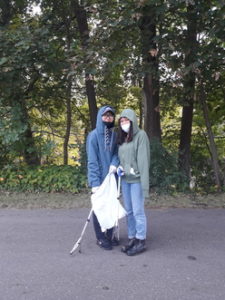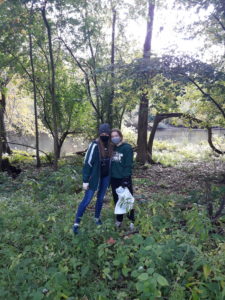Another successful event for OTW on the Kalamazoo River
 On October 3 2020 MUCC’s On the Water program(OTW) took part in the annual Krazy for the Kazoo event in Battle Creek. Krazy for the Kazoo is an annual effort to clean up streams and rivers in the Kalamazoo River Watershed where illegal dumping and litter are big problems. Litter has the potential to cause harm to human health, safety, welfare, as well as the environment. The harmful impact of litter includes trapping or poisoning animals, killing aquatic life directly through choking and indirectly through its impact on water quality.
On October 3 2020 MUCC’s On the Water program(OTW) took part in the annual Krazy for the Kazoo event in Battle Creek. Krazy for the Kazoo is an annual effort to clean up streams and rivers in the Kalamazoo River Watershed where illegal dumping and litter are big problems. Litter has the potential to cause harm to human health, safety, welfare, as well as the environment. The harmful impact of litter includes trapping or poisoning animals, killing aquatic life directly through choking and indirectly through its impact on water quality.
Due to COVID-19 this was the first year Krazy for the Kazoo was set up with multiple sites spread out along the watershed and it was a massive success. 120 volunteers came out to 20 sites to help out the Kalamazoo River over the weekend. In total over 720 pounds of trash were removed from the river, 890 acres were cleaned up,30 native plants where installed along the river banks to prevent erosion and 6,240 cubic feet of brush where removed from the watershed to help the flow of the river. These events are made possible and are this successful due to the volunteers who care about this watershed and have formed an environmental stewardship with the watershed that surrounds them.
 Currently, MUCC is seeking large scale funding to continue our On the Water Program through 2021. Collaborators on this project will continue to assist in fund development and letters of support for future grant applications. Project partners have also established a foundation of collaboration and understanding between agencies, which bodes well for work on future projects in the region.
Currently, MUCC is seeking large scale funding to continue our On the Water Program through 2021. Collaborators on this project will continue to assist in fund development and letters of support for future grant applications. Project partners have also established a foundation of collaboration and understanding between agencies, which bodes well for work on future projects in the region.
If future funding does not materialize due to the current funding climate, the OTW program will leave behind a positive lasting impact on the watersheds and communities. The environment and natural resources of Michigan will still have long-term ecological benefits from the completion of this project and the overall program.
If you have questions or comments about the event, please contact Emma Nehan at enehan@mucc.org.
The post Another successful event for OTW on the Kalamazoo River appeared first on Michigan United Conservation Clubs.
Recent Posts



